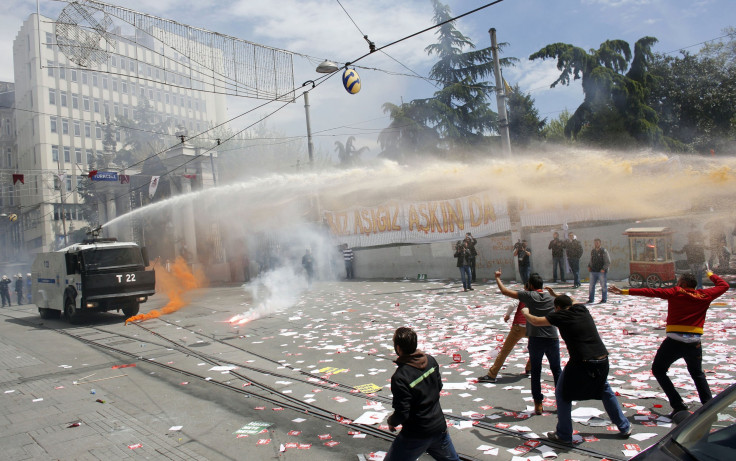Turkish Soccer Fans Go On Trial For Charges Of Attempting A Coup; Erdogan Says He Will Hunt 'Traitors'

Thirty-five soccer fans charged with attempting to stage a coup during protests in Turkey last year went on trial Tuesday in Istanbul. The trial is just one recent example, among many, of how President Recep Tayyip Erdogan is cracking down on those he perceives to be disloyal. Human rights organizations, including Human Rights Watch, have branded the trial "a blatant misuse of the criminal justice system."
“Charging these Beşiktaş football club fans as enemies of the state for joining a public protest is a ludicrous travesty,” said Emma Sinclair-Webb, senior Turkey researcher at Human Rights Watch, in a written statement. “The indictment contains no evidence to support the coup attempt charges and should never have come to court. The prosecutor should immediately indicate that he does not believe the charges should be pursued and ask the court for their acquittal.”
Large crowds gathered outside the Istanbul courthouse to support the soccer fans. Many of them came from the main opposition Republican People's Party (CHP).
The soccer fans are supporters of the club Beşiktaş, associated with a fan group known as Carsi. The group joined the mass anti-government protests in June 2013. The protests were triggered by anger at the government's plan for development on the site of Gezi Park in Istanbul.
At the beginning of September, the group was indicted on charges of a "coup attempt" against the government. The trial began Tuesday and it is not clear how long it will take to carry out. According to the indictment, the defendants are accused of attempting to storm the prime minister's offices in Ankara and Istanbul last year when Erdogan held that role. The indictment said the defendants had the aim of creating an "Arab Spring-like upheaval."
Human Rights Watch said Tuesday that the evidence in the indictment contains no allegations that fit an attempt to overthrow the government. The indictment merely includes intercepted telephone calls and text messages, the defendants' possession of gas masks and goggles, and video footage that shows the fans were present at the demonstrations.
Another trial is in progress in another Istanbul court for 255 people who participated in the Gezi Park protests. They are charged with joining unlawful demonstrations, refusing orders to disperse and damaging public property.
In April, a prosecutor in Ankara put imam Fetullah Gulen, head of the influential Islamic brotherhood Hizmet, under investigation for "constitutional crimes." Erdogan, who was at the time prime minister, requested the U.S. extradite Gulen, who has lived for years in Pennsylvania. Erdogan claimed that Gulen plotted against the government by instigating judicial probes into the government's financial dealings.
Last week, Turkish police raided media outlets and arrested dozens of journalists on charges of them being involved in "dirty operations" with the government's political enemies. The police raided the Zaman daily and Samanyoly television station, which are closely linked with Gulen.
The European Union criticized Erdogan and said the arrests of journalists were incompatible with "European values." In response, Erdogan said "The EU should mind its own business and keep its own opinions to itself," denying that the arrests infringed on press freedom.
© Copyright IBTimes 2024. All rights reserved.











